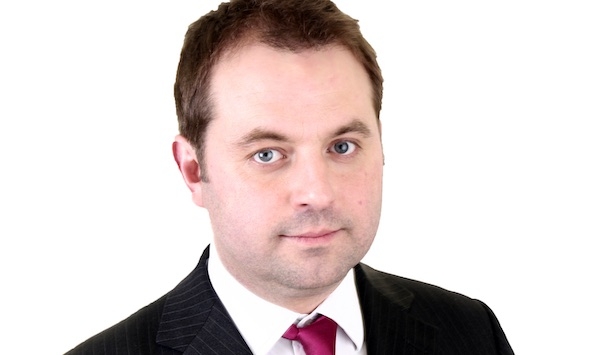
Former Financial Planner turned author and consultant James Woodfall explains how emotional intelligence works and how Financial Planners can utilise the benefits of EI to understand their clients better.

With so many other challenges facing the wealth management sector, from legacy technology to developing compelling products and services, why are firms turning their attention to complaints?, writes Kate Monserrate, co-founder of advice and wealth management business consultancy Simplify Consulting.

Investment expert Fraser Donaldson of Defaqto writes a regular column on DFMs for Financial Planning Today magazine, our sister publication and this is his latest column in the current issue to give you a taste of the column. To view Fraser's past columns and lots more content in the magazine register and subscribe to the magazine. If you are not yet registered for Financial Planning Today website do so now to find out more. Registration is free.

Investment expert Fraser Donaldson reviews the FCA's latest 'Dear CEO' letter on cash interest. Mr Donaldson, Insight Consultant at Defaqto, writes a regular column on DFMs for Financial Planning Today magazine with the latest column reproduced below. To view Fraser's past columns and lots more content in the magazine register and subscribe to the magazine. If you are not yet registered for Financial Planning Today website do so now to find out more. Registration is free.

Harry Katz, a retired Certified Financial Planner with more than 40 years experience in financial services, takes a sceptical look at recent concerns that HNW clients are facing a major problem due to rapidly rising Inheritance Tax (IHT) bills.
In recent times we've all seen the many reports about rapidly rising IHT bills, with the government seemingly raking in rapidly rising IHT receipts - at the cost of the taxpayer, of course.
All this implies that large numbers of people are being clobbered with big bills but is this really the case? Or is it just a case of scare-mongering when some simple basic financial advice and some realism would suffice to head off much of the problem?
These IHT bills, the common wisdom goes, are being paid by High Net Worth (HNW) clients but we should look at what we consider to be HNW. When I was working as an adviser I regarded HNW as anything over £1million in liquid assets.
These people certainly have wealth to transfer to the next generation but I have suspected for quite some time that, as irksome and egregious as this tax is, much of the angst has been promulgated by the providers. And many advisers also have been only too happy to climb onto the bandwagon in the hope of generating income.
I dealt with those who were considered better off for most of my career as an IFA. I have to admit that IHT was not a primary concern for the majority. Yes, there were those who were concerned, but solving their problems was never straightforward – if it could be solved at all.
Everyone is different, so there is no uniform solution that fits all. Trusts are all well and good, but mainly cater for those who do not trust their potential beneficiaries. I found that the best trust was the trust between family members.
So, what do we have? There are those (mainly in the South East) whose main asset is their house and they do not have that much in liquid assets. They may have a pension and the best solution here, in my view, is an annuity as it is very IHT efficient. So, what can you do with a house? Sell it to convert it into cash and move to something smaller, or rent. Not a very popular solution. Move in with the kids. Possible, but again not for everyone.
Those with liquid assets well yes, you can give the assets away and hope to live seven years to avoid tax, but inter vivos insurance does work well in this case. I usually suggested that the potential beneficiaries paid the premium – after all they are the ones who will gain.
But mentioning lifetime gifts is often met with ‘gift aversion’ in my experience. Whole life is sometimes another favoured option, but on closer analysis it is not always cost effective. Take a 60-year-old in reasonable health (they have to be to get the cover at a decent rate). Life expectancy for a male, for example, is currently 80. If he survives, that equates to 20 years premiums. How does the total cost of these premiums compare to the tax saved? Favourably? Possibly...possibly not.
You also have to consider whether the client is getting richer or poorer if you want total cover. Then again it should be the beneficiaries who pay. The most efficient result is if the client dies well before his typical life expectancy – hardly ideal for the client.
There are indeed other ways to ameliorate the tax, many of which do not involve using a ‘product’. In any event, the fact that HMRC enjoys greater and greater revenue in receipts from this tax is in fact (as we all know) a disgrace. Assets have been built up after tax has been paid and on death more tax is taken. Ghoulish.
But it would seem obvious to me that some of this tax is collected because the taxed have not sought decent financial advice. Let us bear in mind that the current nil rate is £325,000 – for a married couple this doubles to £650,000 and then there is residence nil rate of £175,000. So, on a £1 million house £175,000 is payable in IHT. But £825,000 is tax free. Better than a smack in the nose!
Anyway, as I often said to clients ‘Why worry about IHT – you’re not paying it and, in any event, 60% in the hands of your beneficiaries is better than nothing.’
With regard to the house there is the option of equity release, which is bound to be spotted by readers. But the HNW client is going to look at the figures and agree with me that this is just an egregious rip off. Shared equity is a little fairer than a lifetime mortgage but, at the interest rates quoted, the whole house would disappear financially in about 12-15 years. Equity release is very much a last resort and emergency measure and hardly appropriate for IHT planning.
Harry Katz is a retired Certified Financial Planner based in London

Simon Hodges, director of policy at STEP (the Society of Trust and Estate Practitioners), questions whether the current rules surrounding Inheritance Tax (IHT) are fit for purpose.

Richard Mattison, director at SSAS specialist Whitehall Group, comments on the scrapping of the Lifetime Allowance, the raising the Annual Allowance and the unintended consequences they could cause.

Experienced compliance consultant Tony Catt looks at the consequences for advisers of the FCA's new Consumer Duty which begins on 31 July.
For most advisers, the Consumer Duty is simply the latest effort by our regulator to get advisers to treat clients fairly and not rip them off. How hard can that be?
One of the things that I feel is of key importance is that advisers need to look at their own products – their advice process. This is not simply the process that involves – know your client, set objectives, do research, present and then implement. More importantly, and in my opinion more interestingly, this involves looking at their ongoing service and client reviews.
This originates with the IDD and fee agreements. Do the clients understand how and when they are going to pay the adviser for their service? More importantly, do they understand what they are going to get from the adviser in the future for that payment?
This comes into the realms of segmenting clients into service levels. Traditionally, this has largely been done using size of funds as the criterion. This should really be done by time of life. So, you may have:
This list is not exhaustive and bear in mind that planning for most of those elements may not happen in that order. Most likely it may happen together and need to be prioritised into short-term and long-term goals.
Anybody who has attended the FCA Live & Local events (strongly recommended) will know that the FCA differentiates between price and value. Price is what you pay. Value is what you get.
So, the blanket application of 0.5% - 1% in charges may not prove to be appropriate for many people – neither clients nor the adviser firm.
Someone with £1m invested will pay £5,000 per year. Someone with £100,000 will pay £500 per year. There will always be an element of cross-subsidy. This is accepted by the FCA.
If an adviser values their time at £200 per hour, then the £1m client pays for 25 hours and £100k client pays for 2.5 hours. It depends how much the adviser does for a client, but neither of these figures are likely to be right for either of those clients.
Advisers need to do the exercise of working out how much time they actually spend with their clients. While this may take some time, it may prove worthwhile if it gives a more accurate valuation of the adviser’s time and therefore the value of the adviser firm.
Treating clients fairly does not mean giving them all the same service or charging them the same amount of money. This exercise may well lead to increased charges for clients and the FCA will not be concerned, if it can be seen that clients are receiving fair value.
Do the exercise, you may be pleasantly surprised that you can reasonably increase your charges. The FCA needs adviser firms to be profitable to remain operating. Remember to keep the evidence of your consideration of this issue.
Tony Catt is compliance consultant at The Catt’s Eye View. He works as a freelance compliance consultant in Financial Services. His clients are mainly adviser firms. He is a member of the Association of Professional Compliance Consultants.
https://www.thecattseyeview.co.uk/
07899 847338 /

Fintech entrepreneur Tessa Lee of Moneyinfo looks at why AI and the latest tech are valuable tools for Financial Planners but are no replacement for human interaction.
I wondered what ChatGPT would think about replacing a human Financial Planner so I asked it. Its response was that while it could offer insights and guidance, it cannot replace the expertise and personalised advice offered by a human.
When I said I was anxious about having enough money in retirement it suggested that I consult with a qualified Financial Planner who could provide valuable guidance, personalised advice and peace of mind.
If AI doesn’t think it can replace the human planner then why should we?
Technology and humans possess fundamentally different abilities. Computers are good at automation. They are faster and more accurate than us.
They complete repetitive tasks without making mistakes or getting bored, but they are not emotional or empathetic.
Where computers act based on the inputs or data they receive, humans possess a very different type of intelligence. Often what people say is not what they actually feel. Humans sense emotion and vulnerability. They understand nuances of behaviour or cultural differences. They make judgements and adapt to changing circumstances. This is why computers, even the artificially intelligent ones, cannot replace a real-life Financial Planner.
Instead, technology’s role is to enhance what we do. In Financial Planning this means outsourcing tasks to technology to allow planners to focus on what clients really value; the conversations they have with their planner and the peace of mind that this brings.
Today’s clients, young or old, expects access to information and service in a digital way because this is what they get in all other aspects of their lives. In today’s world it is also critical that firms can communicate securely with their clients but in a way that is easy for them.
Every firm I speak to is looking to improve efficiency throughout their business and remove friction and cost from key processes like on-boarding and client reviews. It’s precisely these processes that technology can enhance, removing paperwork and driving greater efficiency. We call this digital relationship management and it’s changing the way Financial Planning firms do business for the better.
Imagine that a client gets a push notification through your app to update their digital fact find when their review is due, or to nudge them to review a financial plan report or accept your client agreement.
Through tailored workflow processes to perform key tasks, such as getting clients to book meetings or sending out documents, business processes can be speeded up. When tasks can be completed in minutes rather than days your business becomes more profitable.
Instead of replacing human interaction, technology frees up time for everyone to focus on more rewarding and valuable tasks. Planners can then spend more quality time talking to clients and nurturing new relationships.
Technology is far from becoming the next super-planner. In reality, it’s an ally not an enemy and it’s there to help you do business in a more efficient and profitable way. Clients will always value and want the human relationship in Financial Planning…just ask ChatGPT!
Tessa Lee is managing director of Moneyinfo, a fintech firm based in Henley in Arden, Warwickshire, specialising in client portals and mobile apps for the wealth management industry. Ms Lee has more than 20 years’ experience working in financial advice and fintech and holds several CII Financial Planning qualifications.

In this guest column, Paraplanners’ Assembly Big Day Out co-host Sarah Lees looks forward to this year’s conference for Paraplanners. This article first appeared in Financial Planning Today magazine (July-Aug issue).
There’s something about the Paraplanners’ Assembly’s Big Day Out (and, before that, the national Powwow) that I’ve always found irresistible.
It might help explain why, when Sam Tonks and I welcome the 2023 Assembly to our national gathering at 10am on 14 September, it will be the seventh time I’ve taken part in the national event in a 10-year Paraplanning career.
Looking back, it would be easy to think that the unconventional staging of a financial services event in teepees on a farm was the big draw.
Yes, the teepees were great, but the Big Day Out’s post-lockdown home, FarmED, is simply stunning. Set on a hillside in the heart of the Cotswolds, the RIBA award-winning venue has given the event a new vibe: an annual retreat where you can reset, revive and thrive.
I think what makes the Big Day Out - and the Assembly more generally - so distinctive is that it’s only for Paraplanners. To quote the blurb from the website: “You’ll feel you belong at an Assembly because the Assembly belongs to you.”
Paraplanners host the day. There are Paraplanners leading each group. We make sure the breaks are long enough for people to catch up or meet for the first time. It’s never been about numbers but quality of experience (participant numbers are set at 100.)
The food matters. So do the sweets. And the ticket price is affordable for all Paraplanners.
At the heart of it all is the Assembly’s original idea - informal gatherings where Paraplanners can exchange views, learn things, fix things and share things. That’s as true today as it was 10 years ago.
To find out more about the Big Day visit: https://paraplannersassembly.co.uk/event/the-big-day-out-2023/
Sarah Lees FPFS, STEP Affiliate, works as a senior Paraplanner at Mazars. She is the CISI Paraplanner of the Year 2021 and co-host of the Big Day Out.
Paraplanner Assembly:
https://paraplannersassembly.co.uk
Page 1 of 3